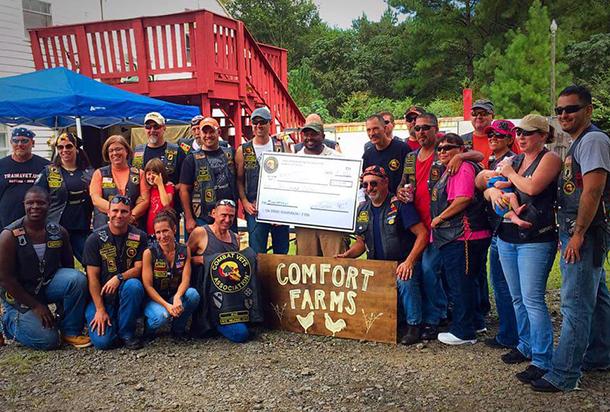How working the land is helping US war veterans heal
Veterans and volunteers gather to celebrate a September 2016 donation to Stag Vets, the nonprofit that runs Comfort Farms.
Veterans coming back from conflict often struggle with the transition to civilian life. They have higher rates of depression and suicide, and they’re more likely to be unemployed. On top of that, service members must often wait months for appointments at Veterans Affairs health facilities.
So, a combat vet in Georgia has founded a farm designed to immerse returning soldiers in the restorative rigors of working the land.
It’s been a long journey for Jon Jackson, from the battlefield to farmland, and he knows personally the challenges of coming home from war. He served six tours in Iraq and Afghanistan and returned with post-traumatic stress disorder and traumatic brain injury. Getting care has been difficult.
Initially, he was seeing a psychiatrist at the VA center in Tuskegee, Alabama. But, he says, he was told he had to wait six months between appointments. “Every appointment that I got with them was because it was like, ‘No I need to see you right now,’” Jackson says. “I’m fighting, fighting, fighting. Then you get sick and tired of fighting. Why am I fighting for care? Well, guess what happened within that six months? I found out I got diabetes.”
Jackson wanted more immediate attention, so he moved with his family to Milledgeville, Georgia, and started going to a nearby VA facility in Dublin, where he says care is better. And, he started a farm.
It’s called Comfort Farms, named in honor of a friend of Jackson's who was killed in action in Afghanistan. Comfort Farms is ripe with okra and tomatoes and home to chickens and pigs.
For Jackson, farming fits like a glove as he readjusts to life as a civilian with the scars of war.
“Farming is chaos, and I like chaos,” he says. “I’m constantly here, struggling against Mother Nature, struggling against pests; but when you win, you get those small victories.”
“Animals don’t care about your bad day,” Jackson adds. “They’re going to come up, and they’re like, ‘I want you to pet me.’ And you’re like, ‘OK, I’m feeling really mad right now, but I’m petting you.’ Man, [these animals] don’t know the amazing stuff that they’re doing for our vets who come through.”
Georgia's Farmer Veterans – Jon Jackson/Comfort Farms from Georgia Organics on Vimeo.
Jackson got a USDA grant to travel the state training vets in agriculture. So far this year, 150 vets and their families have visited his farm. One of them is Thomas Scott Kennedy, who also suffers from PTSD.
Kennedy has also been dealing with waits for care at the Dublin VA, although most of those waits have been less than 30 days. He says working on Comfort Farms helps him while he waits.
“You’re dealing with the VA every other week, or once a month, but in the farming environment, with Jon and the farm, every morning you’re up doing something,” Kennedy says. “You’re taking care of the animals. You’re looking outward. You’re not looking inward. That’s helpful.”
Melinda Paige, a counselor in Atlanta who works with people suffering from PTSD, says banding together as a team, like on a farm, can stimulate brain activity. “I believe they do better when they have a shared mission,” Paige says. “They’re extremely resilient, strong individuals. PTSD is a treatable medical condition. … The brain is simply injured by the high stress that they’ve lived with, and it can be healed.”
There are still a lot of unknowns about the benefits of farming for veterans. But it may take off as the nation’s farmers get older, and the VA searches for ways to improve care while cutting down on wait times.
Nearly half of veterans returning from Iraq and Afghanistan are from rural areas, but the USDA says very few go into farming. The director of the Dublin VA, Maryalice Morro, sees her center’s location in rural Georgia as an opportunity. She is talking with the state’s department of agriculture about growing fresh produce on-site, which can be used in her center’s cafeteria.
“We house approximately 115 veterans in our domiciliary, mental health rehabilitation program that helps veterans with homelessness, PTSD, substance abuse and/or a combination of those to get back on their feet,” Morro says. “They’re usually here for a period of 60 to 90 days, so it would be a great way to teach them new skills or give them something to do while they’re here. It could be therapeutic.”
This article is based on a story by Sean Powers of Georgia Public Radio. The story aired on PRI’s Living on Earth with Steve Curwood.
The story you just read is accessible and free to all because thousands of listeners and readers contribute to our nonprofit newsroom. We go deep to bring you the human-centered international reporting that you know you can trust. To do this work and to do it well, we rely on the support of our listeners. If you appreciated our coverage this year, if there was a story that made you pause or a song that moved you, would you consider making a gift to sustain our work through 2024 and beyond?
